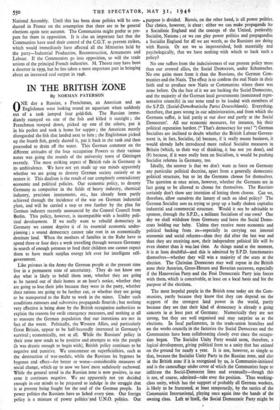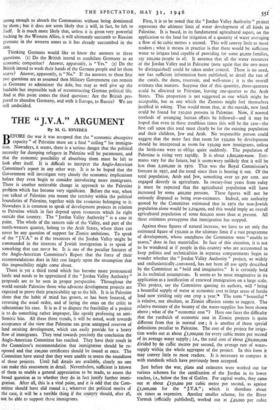IN THE BRITISH - ZONE
By NORMAN PATERSON
ONE day a Russian, a Frenchman, an American and an Englishman were looking round an aquarium when suddenly out of a tank jumped four gold-fish. The Russian imme- diately stamped on one of the fish and killed it outright ; the Frenchman stooped down, picked up one of the others, put it in his pocket and took it home for supper ; the American merely disregarded the fish that landed next to him ; the Englishman picked up the fourth fish, gently dusted it, put it back in the tank and then proceeded to drain off the water. This German comment on the different attitudes of the four occupation Powers to their various zones was going the rounds of the university town of Gottingen recently. The most striking aspect of British rule in Germany is its ambivalence. We have not yet made up our minds apparently whether we are going to destroy German society entirely or to restore it. This dualism is the result of our completely contradictory economic and political policies. Our economic policy, to destroy Germany as competitor in the fields of heavy industry, chemical industry, precision instruments, etc., has already been partly achieved through the incidence of the war on German industrial plant, and will be carried a step or two further by the plan for German industry recently announced by the Control Council from Berlin. This policy, however, is incompatible with a healthy poli- tical development. If we really want to rebuild democracy in Germany we cannot deprive it of its essential economic under- pinning; a sound democracy cannot take root in an economically destitute land. When the mothers of families in the Ruhr have to spend three or four days a week travelling through western Germany in search of enough potatoes to feed their children one cannot expect them to have much surplus energy left over for intelligent self- government.
Like privates in the Army the German people at the present time live in a permanent state of uncertainty. They do not know one day what is likely to befall them next, whether they are going to be turned out of their homes at an hour's notice, whether they are going to lose their jobs because they were in the party, whether their rations are going to be further cut, or whether they are going to be transported to the Ruhr to work in the mines. Under such conditions rumours and subversive propaganda flourish ; but nothing very effective is being done by the British occupation authorities to explain the reasons for swift emergency measures, and nothing at all to reassure the German population that our intentions are not in fact of the worst. Politically, the Western Allies, and particularly Great Britain, appear to be half-heartedly interested in Germany's survival ; economically, not at all. While the Russians' policy in their zone now tends to be positive and attempts to win the people (it was drastic enough to begin with), British policy continues to be negative and punitive. We concentrate on superficialities, such as the destruction of war-medals, while the Russians let bygones be bygones and effect—for better or worse—considerable measures of social change, which up to now we have most sedulously eschewed. While the general trend in the Russian zone is now positive, in our zone it continues negative. We are apparently not yet decided. enough in our minds to be prepared to indulge in the struggle that is at present being fought for the soul of the German people. In power politics the Russians have us licked every time. Our foreign policy is a mixture of power politics and U.N.O. politics. Our • purpose is divided. Russia, on the other hand, is all power politics. Our choice, however, is clear: either we can make propaganda for a Socialistic England and the concept of the United, preferably Socialist, Nations ; or we can play power politics and propagandise a Socialist England for MI we are worth, as the Russians are doing with Russia. Or are we so impoverished, both materially and psychologically, that we have nothing • with which to back such a policy?
No one suffers from the indecisiveness of our present policy more than our avowed allies, the Social Democrats, under Schumacher. No one gains more from it than the Russians, the German Com- munists and the Nazis. The effect is to confirm the real Nazis in their faith and to produce new Nazis or Communists where there was none before. On the face of it we are backing the Social Democrats, and the majority of the German local governments (nominated repre- sentative councils) in our zone tend to be loaded with members of the S.P.D. (Sozial-Demokratische Partei Deutschlands). Everything, therefore, that goes wrong in our administration, and from which the Germans suffer, is laid partly at our door and partly at the Social Democrats'. All our economic measures, for instance, hit their political reputation hardest. (" That's democracy for you! ") German Socialists are inclined to doubt whether the British Labour Govern- ment is, in fact, Socialist, (a) because, if it really meant business, it would already hatie introduced more radical Socialist measures in Britain (which, to their way of thinking, it has not yet done), and (b) because, if it were really bent on Socialism, it would be pushing Socialist reforms in Germany, too.
Ideally, the answer is that we don't want to force on Germany any particular political doctrine, apart from a generally democratic political structure, but to let the Germans choose for themselves. The question at once arises, however, whether the Germans are in fact going to be allowed to choose for themselves. The Russians certainly don't show any intention of letting them choose. Can we, therefore, allow ourselves the luxury of such an ideal policy? The German Socialist sees us trying to prop up a badly shaken capitalist industrial and commercial structure. Would it not be advisable to sponsor, through the S.P.D., a militant Socialism of our own? One day we shall withdraw from Germany and leave the Social Demo- crats holding our baby. Unless they receive more economic and political backing from us—especially in carrying out internal economic and social reforms—than they did after the last war and than they are receiving now, their independent political life will be even shorter than it was•last time. As things stand at the moment, it is at least doubtful—and this is admitted by S.P.D. functionaries themselves—whether they will win a majority of the seats at the election. The Christian Democrats may well repeat in the British zone their Austrian, Gross-Hessen and Bavarian successes, especially if the Hanoverian Party and the Free Democratic Party join forces with them, which is conceivable, at least on a local basis and for the purpose of the elections.
The most hopeful people in the British zone today are the Com- munists, partly because they know that they can depend on the support of the strongest land power in the world, partly because they see that their kind of democracy is already a going concern in at least part of Germany. Numerically they are not strong, but they are well organised and may surprise us at the elections. In local parliaments, in the trade-union branches and on the works councils in the factories the Social Democrats and the Communists have been collaborating closely ever since the occupa- tion began. The Socialist Unity Party would seem, therefore, a logical development, giving political form to a unity that has existed on the ground for nearly a year. It is not, however, as simple as that, because the Socialist Unity Party in the Russian zone, and also in the British zone if it is recognised by us, is Communist-initiated and is the camouflage under cover of which the Communists hope to infiltrate the Social-Democrat lines and eventually—though this is not, of course, admitted—take over the position. Thus working- class unity, which has the support of probably all German workers, is likely to be frustrated, at least temporarily, by the tactics of the Communist International, playing once again into the hands of the owning class. Left to itself, the Social Democratic Party might be
strong enough to absorb the Communists without being dominated by them ; but it does not seem likely that it will, in fact, be left to itself. It is much more likely that, unless it is given very powerful backing by the Western Allies, it will ultimately succumb to Russian ptessure in the western zones as it has already succumbed in the east.
Thinking Germans would like to know the answers to three questions. (1) Do the British intend to annihilate Germany as an economic competitor? Answer, apparently, is "Yes." (2) Do the British intend to wash their hands of the German people and let them starve? Answer, apparently, is "No." If the answers to these first twe questions are as assumed then Military Government can remain in Germany to administer the dole, but may as well give up the laudable but impossible task of reconstructing German political life. And at this point comes the third question: Are the British pre- pared to abandon Germany, and with it Europe, to Russia? We are still undecided.































 Previous page
Previous page